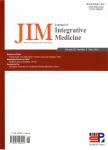Remission of type 2 diabetes depends on prompt comprehensive lifestyle changes upon diagnosis: How can this“Road to Damascus” experience be supported?
Remission of type 2 diabetes depends on prompt comprehensive lifestyle changes upon diagnosis: How can this ‘‘Road to Damascus” experience be supported?作者机构:Division of Endocrinology and Metabolism and Diabetes CentreFirst Department of Internal MedicineMedical SchoolAristotle University of ThessalonikiAHEPA University Hospital54636 ThessalonikiGreece Diabetes CentreSecond Department of Internal MedicineDemocritus University of Thrace68100 AlexandroupolisGreece
出 版 物:《Journal of Integrative Medicine》 (结合医学学报(英文版))
年 卷 期:2022年第20卷第4期
页 面:288-291页
核心收录:
学科分类:1002[医学-临床医学] 100201[医学-内科学(含:心血管病、血液病、呼吸系病、消化系病、内分泌与代谢病、肾病、风湿病、传染病)] 10[医学]
基 金:Eli-Lilly Astra-Zeneca GSK MSD Novo Nordisk Novartis Sanofi-Aventis TrigoCare International EliLilly Galenica Pfizer
主 题:Type 2 diabetes Remission Exercise Diet Lifestyle change
摘 要:Theoretically, a new diagnosis of type 2 diabetes mellitus(T2DM) requires a dramatic change in an individual’s way of life. Weight loss and physical activity can lead to remission of diabetes, which has been associated with a lower risk of developing complications. Today, the importance of a healthy lifestyle is further highlighted by data showing that obesity and diabetes increase the risk of severe complications from coronavirus disease 2019. However, remission rarely occurs in reality, probably due to the inability of people with T2DM to adhere to the intensive lifestyle interventions that are necessary. The complexity of contributing factors may explain why making these changes is so challenging and underscore the fact that there is no magical solution for T2DM. Instead, hard work from both patients and health care providers is needed for the conversion to be achieved. This article calls for more research on the underlying reasons why adhering to a healthy way of life is so difficult for people with diabetes and obesity. Clearly defining these barriers would facilitate the planning of effective policies to promote the adoption of appropriate lifestyle changes early in the course of the disease.



